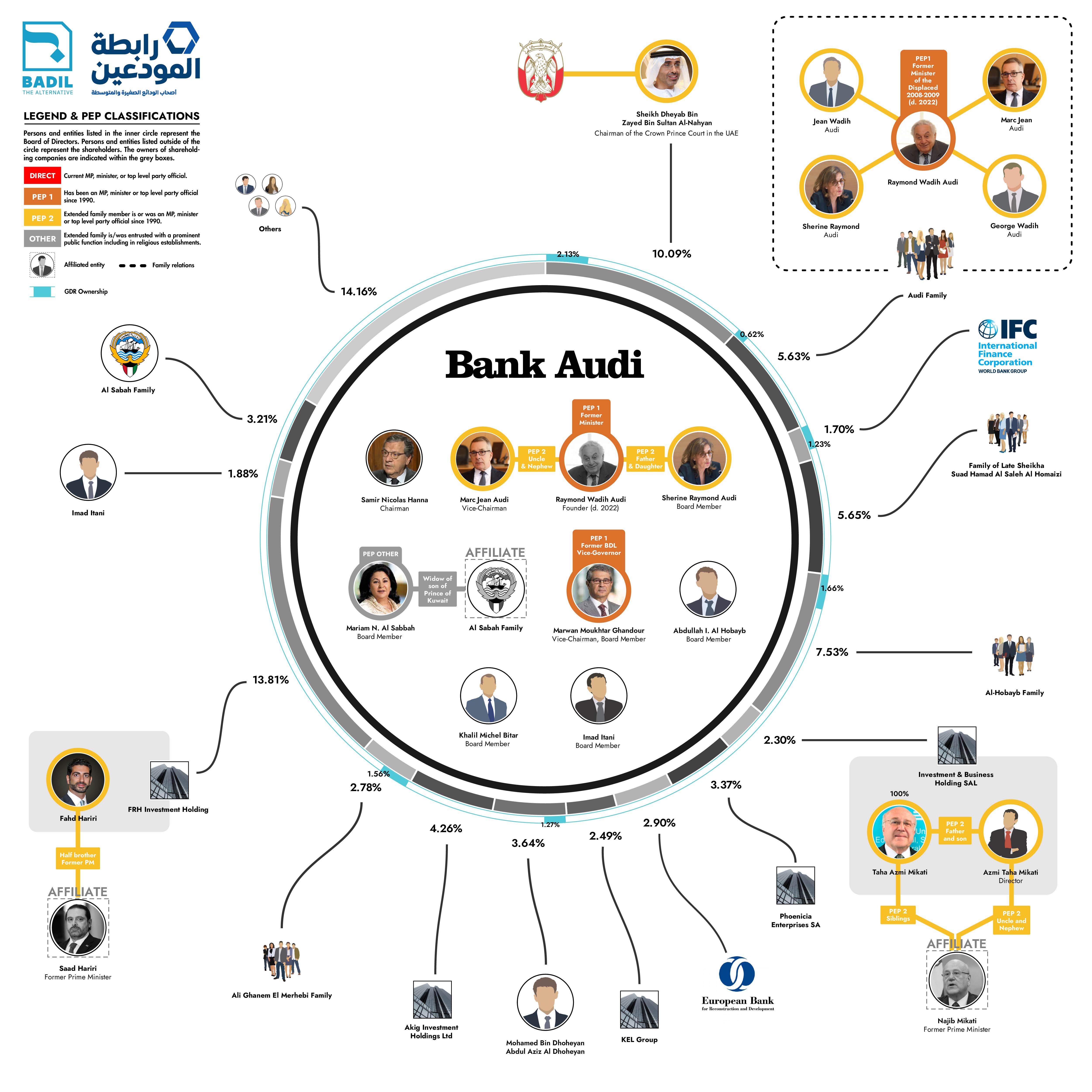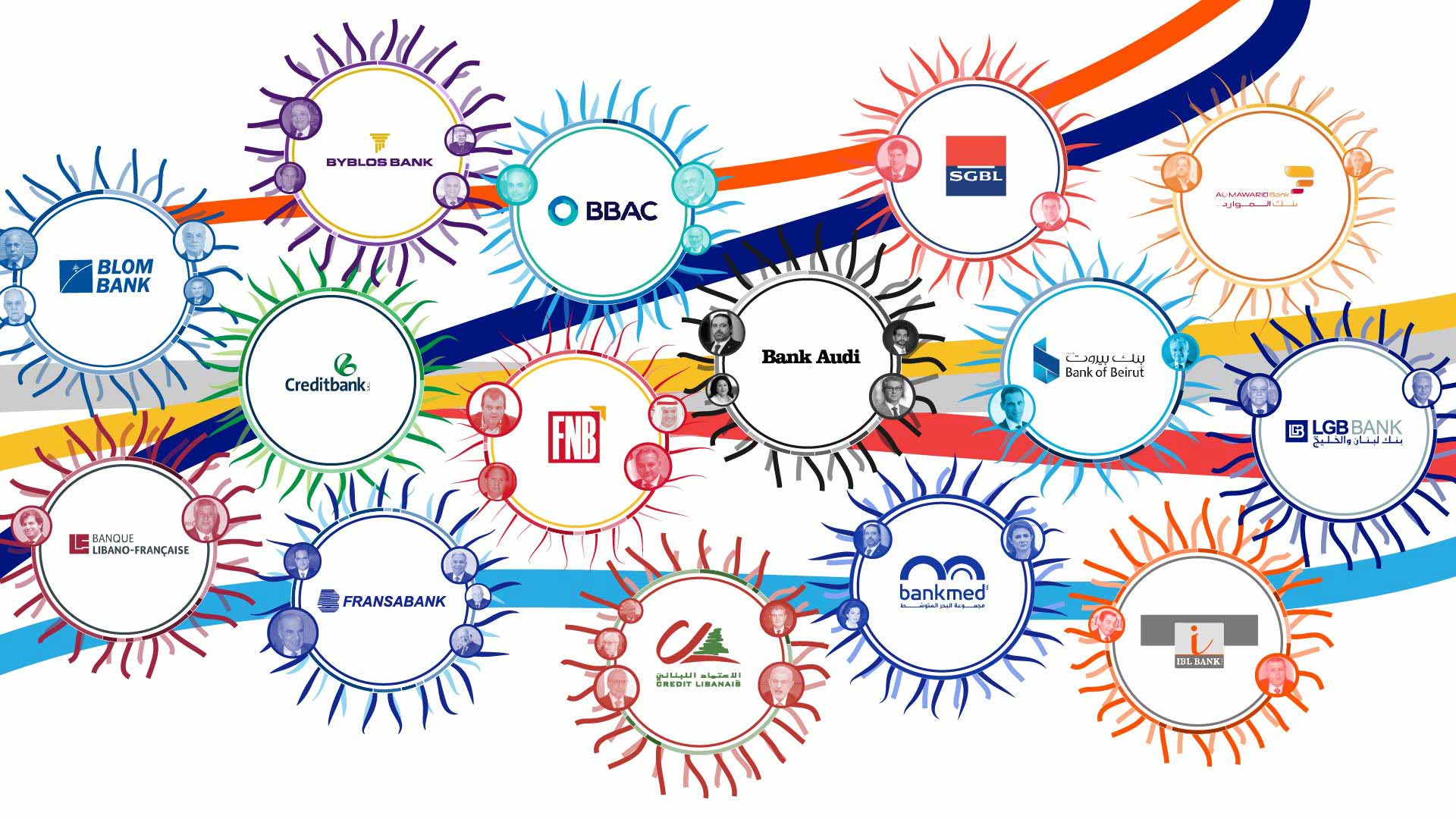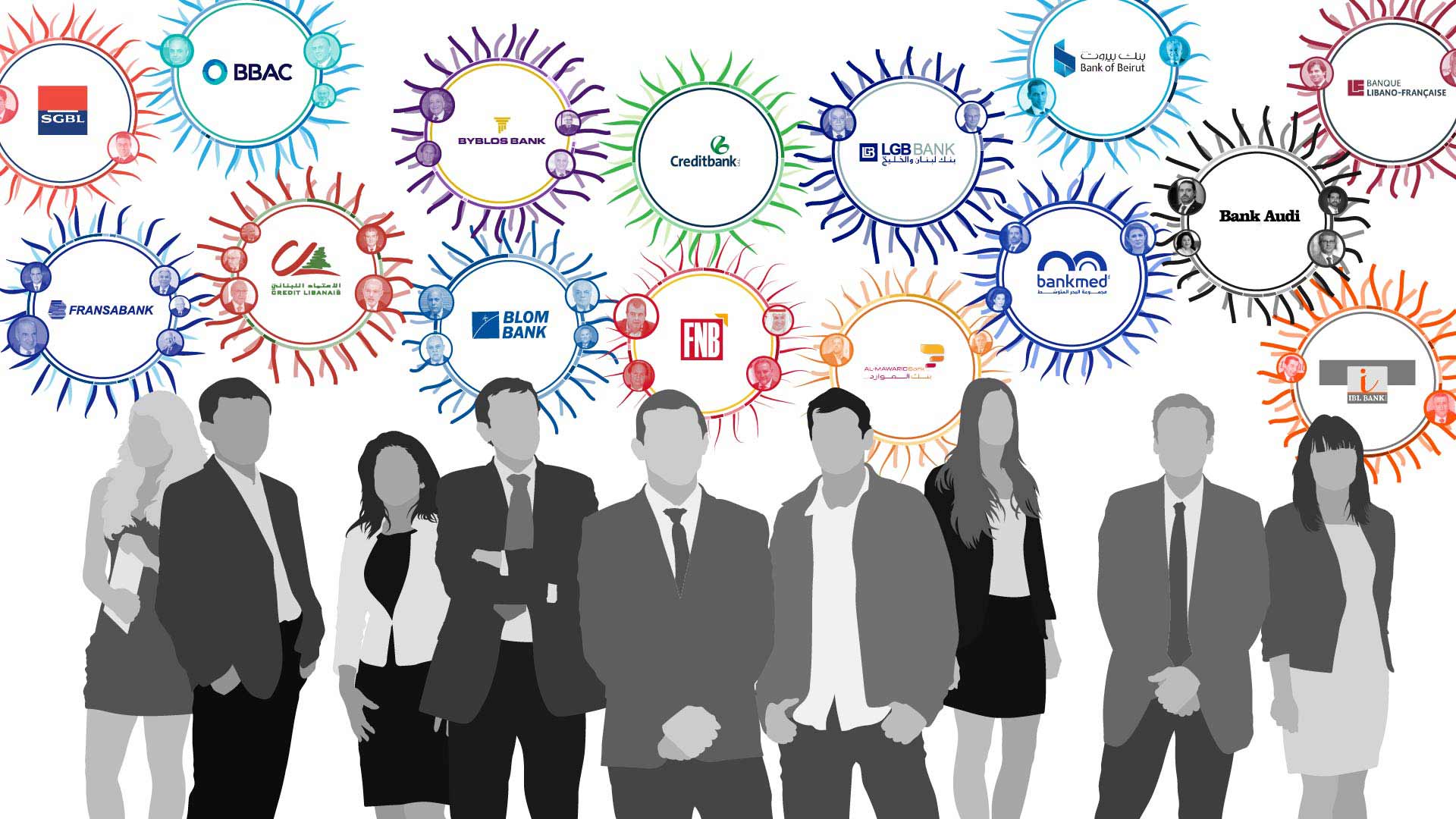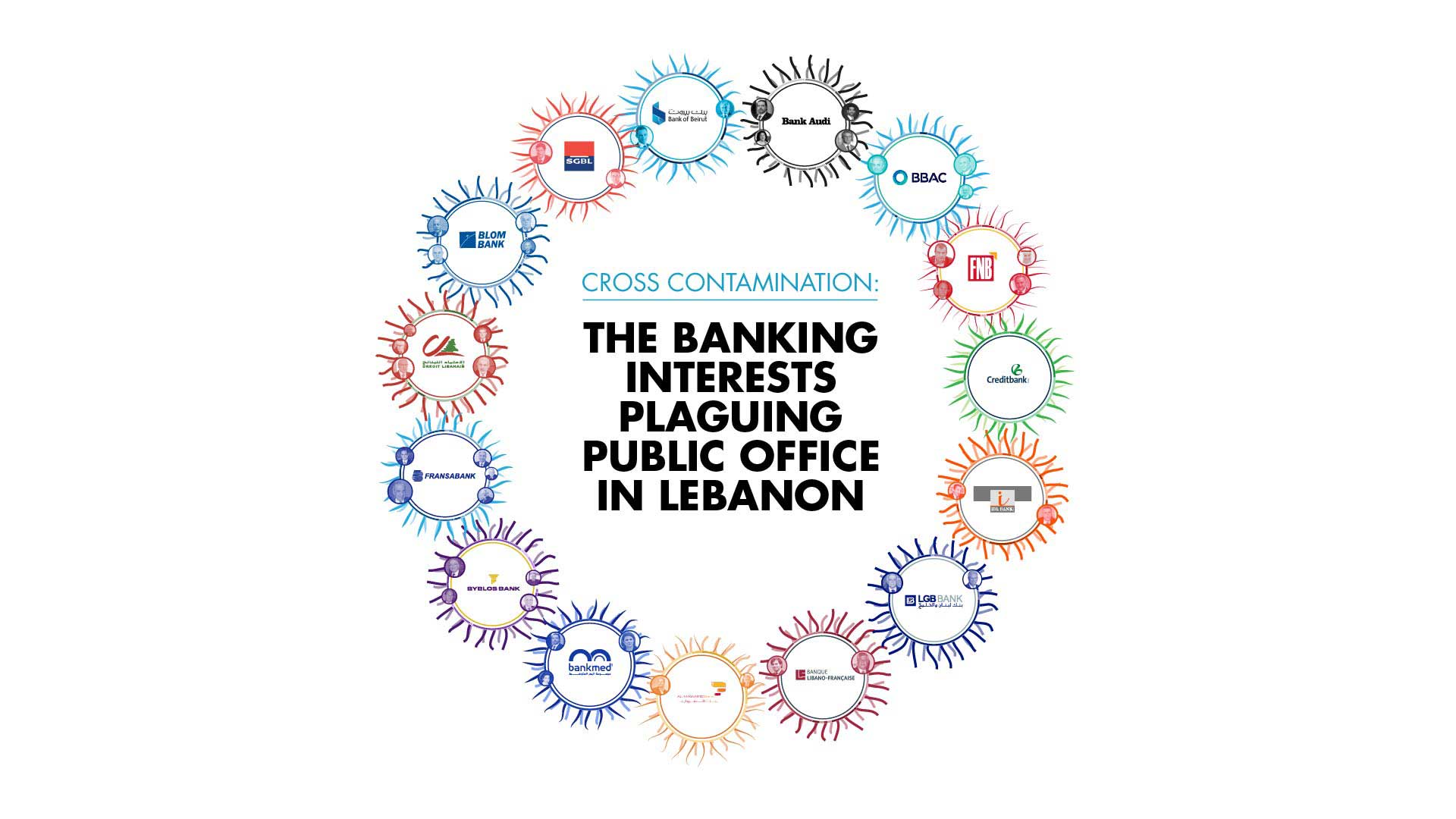Founded: 1962
Total Assets*: US$27.0 billion
Customer Deposits*: US$20.2 billion
Ranking by Assets*: 1
(*as of Dec 31, 2021, ABL Almanac 2022 converted at 1507.5 LBP/USD)
Background
From humble beginnings as an exchange house in Saida established in 1830 that extended credit to farmers,[1] Bank Audi grew into Lebanon’s largest commercial bank by total declared assets.[2] Raymond Audi established the bank in its present form in 1962 with support from his family and Kuwaiti backers. Throughout the 1970s the bank established its first branches abroad, in Switzerland and France, and in the late 1990s and early 2000s, branches across the Middle East.[3]
Board and shareholder composition
Bank Audi’s current board of directors includes three politically exposed people (PEPs). Marc Jean Audi, Raymond’s nephew, vice chairman Marwan Ghandour (former third vice-governor at Banque du Liban),[4] and Sheikha Mariam Al Sabah (of the ruling family of Kuwait).
Among Bank Audi’s major shareholders are a slew of politically connected figures. Fahd Hariri, brother of former prime minister Saad Hariri (2009-11, 2016-20), owns a 13.81% stake, the Audi family with 5.63%, and Taha Mikati, brother to Lebanon’s caretaker Prime Minister Najib Mikati 2.30%.[5]
Gulf Monarchies are also represented in the shareholding structure: Sheikh Dheyab Bin Zayed Bin Sultan Al-Nahyan, who owns a significant 10.09%, is the Chairman of Crown Prince Court in Abu Dhabi,[6] while the Al Sabah of Kuwait own 3.21% of the bank.[7]
The International Finance Corporation and European Bank for Reconstruction and Development hold stakes of 1.70% and 2.90%, respectively.[8]
Under investigation
In 2020, a complex and highly joint investigation by the Organized Crime and Corruption Reporting Project (OCCRP) and Daraj.com revealed that in 2016 Bank Audi acquired shares in a London-based management firm linked to Banque du Liban (BDL) Governor Riad Salameh and his son Nady. This transaction took place amid the central bank’s implementation of the infamous ‘financial engineering’ operations, a policy that, in total, benefited Bank Audi to the tune of US$1.6 billion.[9] The World Bank dubbed financial engineering a Ponzi scheme and a precursor to Lebanon‘s financial collapse.[10]
In 2019, Mount Lebanon public prosecutor Ghada Aoun brought charges against Bank Audi and Najib Mikati (at the time a former Prime Minister and current caretaker PM), for illicitly profiting from BDL-subsidized housing loans. The public prosecutor also charged Taha and Maher Mikati, Najib’s brother and son. Taha Mikati owns his Bank Audi stake via Investment & Business Holding SAL.[11] On February 13, 2023, Ghada Aoun charged Bank Audi with money laundering.[12] Ten days later, caretaker Prime Minister Mikati stepped in and asked security forces not to act on Aoun’s orders, blocking Aoun’s legal action, claiming that it was “an overstepping of authority” intended to “[to] settle political scores”.[13]
[1] Hicham Safieddine, Banking on the State: The Financial Foundations of Lebanon, Stanford Studies in Middle Eastern and Islamic Societies and Cultures (Stanford, California: Stanford University Press, 2019).
[2] Association des Banques du Liban, ‘Almanac of Banks in Lebanon 2022’ (Beirut: Association des Banques du Liban, 2022).
[3] Catholics, ‘H.E. Raymond Wadih Audi, Former Lebanese Minister of Displaced People – Melkite Council’, accessed 3 March 2023, https://www.melkitecouncil.com/Catholics/h-e-raymond-wadih-audi-former-lebanese-minister-of-displaced-people/.
[4] Banque du Liban, ‘GOVERNORATE TIMELINE’, accessed 7 March 2023, https://www.bdl.gov.lb/tabs/index/1/255/Governorate-Timeline.html.
[5] Association des Banques du Liban, ‘Almanac of Banks in Lebanon 2022’.
[6] Crown Prince Court, ‘The Chairman’, accessed 7 March 2023, https://www.cpc.gov.ae/en-us/thecrownprincecourt/CPC_Management/Pages/Chairman.aspx.
[7] Bank Audi, ‘Shareholders’, accessed 9 March 2023, https://www.bankaudigroup.com/group/corporate-governance/shareholders.
[8] Association des Banques du Liban, ‘Almanac of Banks in Lebanon 2022’.
[9] Riad Kobaissi Sabbagh (OCCRP) Tom Stocks (OCCRP), and Rana, ‘Lebanon Central Bank Governor’s Son Moved Millions Abroad While Lebanese Watched Blocked Savings Dwindle’, OCCRP, accessed 8 March 2023, https://www.occrp.org/en/investigations/lebanon-central-bank-governors-son-moved-millions-abroad-while-lebanese-watched-blocked-savings-dwindle.
[10] World Bank, ‘Lebanon Public Finance Review : Ponzi Finance?’ (Washington, DC: World Bank, 2022), https://openknowledge.worldbank.org/handle/10986/37824.
[11] Ministry of Justice, ‘Commercial Registry of Lebanon’, accessed 9 March 2023, http://cr.justice.gov.lb/.
[12] L’Orient Today, ‘Ghada Aoun Targets SGBL amid Spat with Banking Sector’, L’Orient Today, 21 February 2023, sec. Society, https://today.lorientlejour.com/article/1329043/ghada-aoun-targets-sgbl-amid-spat-with-banking-sector.html.
[13] L’Orient Today, ‘Mikati Insists Judiciary Must “act against the Excesses” of Judges’, L’Orient Today, 25 February 2023, sec. Politics, https://today.lorientlejour.com/article/1329554/mikati-insists-judiciary-must-act-against-the-excesses-of-judges.html.
Disclaimer
All content provided in this report (the Report) is for informational purposes only and does not constitute legal, financial or any other professional advice. The Alternative has made every attempt to ensure the accuracy and reliability of the information provided in the Report. However, due to the opacity of available sources of information, The Alternative has relied on the most up to date and self-reported figures from the Association of Banks in Lebanon (ABL) and its member banks, when available. When ABL and banks data was not available, The Alternative relied on physical copies of Lebanon’s commercial registry, online databases and other credible sources. In addition, The Alternative contacted each of the bank’s communications departments for confirmation of data regarding the shareholding and management of said banks. Only Bank Audi and BLOM Bank provided relevant information, both of which have been included in their entirety. Amongst others, the sources of the Report include various commercial registries, official bank websites, online aggregators, databases dedicated to company registration, the Organised Crime and Corruption Reporting Project (OCCRP), Bilanbanques reports, and many others.
The information provided in the Report is done “as is” without warranty of any kind, express or implied. The Alternative shall not be held liable for any errors or omissions in this information nor for the availability of this information. The Alternative does not accept any responsibility or liability for the accuracy, content, completeness, legality, or reliability of the information contained in the Report. Furthermore, The Alternative shall not be liable for any losses or damages from the display or use of this information. If anyone has information relating to the Report, The Alternative welcomes it. All information sent to The Alternative will undergo a thorough validation process, and the report will be updated accordingly. For any relevant information or inquiries, please contact info@thebadil.com.



